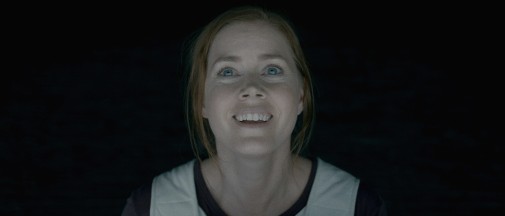
With Hillbilly Elegy upon us, two of Oscar's perennial bridesmaids are back on the hunt for gold. Most of the movie's buzz has centered on Glenn Close's latest attempt at enshrining her career in the glory of Hollywood's most coveted trophy. However, one shouldn't ignore Amy Adams, an Oscar-hungry actress who's only one winless nomination away from tying her costar's record of seven nods and no victory. She'd have already tied Close if not for her infamous snub in 2016.
Despite starring in a Best Picture contender with eight overall nominations, earning citations from the Globes, BAFTA, SAG, and the BFCA, Amy Adams failed to conquer a place in AMPAS' Best Actress lineup for her performance in Arrival…
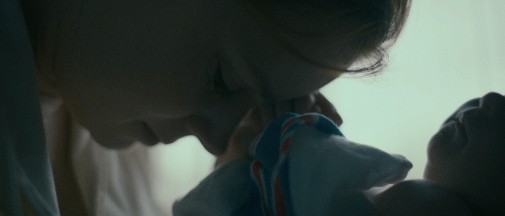
"Memory is a strange thing. It doesn't work like I thought it did" says Amy Adams at the start of Denis Villeneuve's Arrival. Unlike many a great actor whose on-screen brilliance doesn't translate well to narration, the star of this sci-fi drama knows how to work her voice, modulating timbre and tone as a musician tunes their instrument. Though she's not singing, Adams' words flow with melodious sorrow, singing the story of a mother who loves her daughter, who loses her daughter. The gentle cadence of her storytelling is as informed by love as by guilt, aching and devotion, wonderment and marrow-deep grief.
As she speaks, we see images of jubilant motherhood turned into cruel tragedy. Quick impressions, cut together like a half-remembered dream, unfurling to the sound of Max Richter's On the Nature of Daylight. It's a haunting montage, a prologue bound to be mirrored by a similar prologue, brethren of pain with tears going down their faces and bittersweet smiles. What little we see of Adams are brushstrokes of calcinating emotion, joy fading into mourning. Her heart is open to us, but there are secrets in her expression.
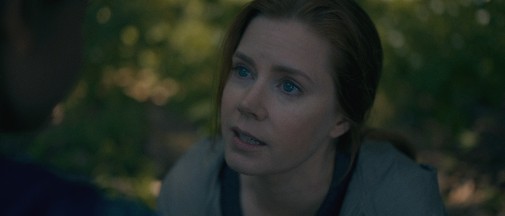
Does she look exhausted when smiling? Is it spiritual weariness or the body's collapse? Does her blank stare speak of steely resignation or the fear of an uncertain parent? Are these remembrances or premonitions, flashes from the past, or whispers from the future? The specificities of cinematic grammar make us assume they are the ghost of yesterday's pain, but time and reminiscence aren't as straightforward as we've known them. Not in the otherworldly realities of Arrival. Not in the phantasmagoria of Amy Adams' performance.
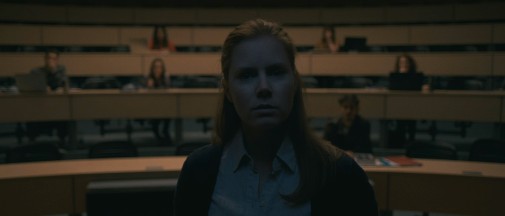
For all its conceptual density, Arrival possesses a simple plot. When a dozen alien ships appear on Earth, the world's governments summon experts to try and communicate with the extraterrestrial beings. In the USA, linguistics professor Louise Banks is summoned to be part of a team trying to establish contact with the space-dwellers who have landed on Montana. As weeks go by, Louise and physicist Ian Donnelly start to learn the heptapods' palindromic writing, its circular form containing a non-linear understanding of time.
As she learns to communicate in different terms, so does Louise learn to live in different paradigms. Her arc is one of problem-solving that bleeds into existential reckoning, academic discovery twisting itself into a personal epiphany. Truth be told, it's hard to overstate the challenging nature of the role, so great are its demands. Louise is a woman facing that which is beyond human comprehension, time as a circle instead of a line, the future as past, the intangible mysteries of the cosmos suddenly materialized.
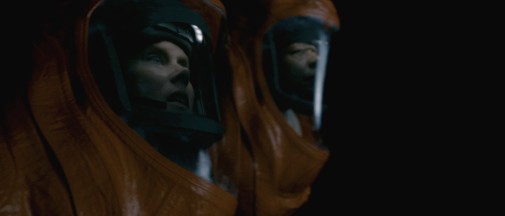
On a more technical, less esoterical, level, Louise is a cerebral character, her mental machinations contained, perchance imprisoned, in long silences and intense stares. To make the act of thinking into a riveting spectacle isn't an easy task. Even when cameras aren't involved, externalizing the interior complexity of reflection, meditation, assimilation, and decipherment is a hard task. After all, one can easily fall into indifferent inexpression or vacuous mugging. With her intelligent eyes, Adams avoids such pitfalls, modulating how Louise hears and reacts, how she ponders before doing, how she remembers.
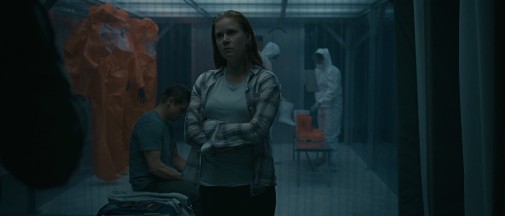
Notice, for instance, Adams' teacherly introduction on the day they arrive. When asked by a student to turn the TV on a news channel, she pauses, considers her pupils' serious faces, and, without saying a word, proceeds to do as asked. There's a sternness to her poise, but also a palpable need to understand those she's talking to. Later, when lying through her teeth to get what she wants from the US military, her eyes don't flutter or dart around. They stay fixed, pointedly unmovable in a show of stubbornness that's contradicted by her nervous body language.
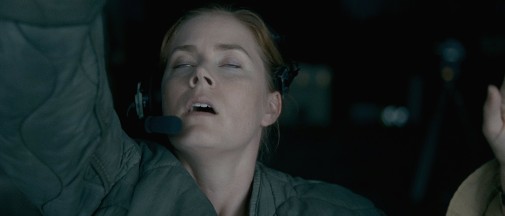
Nevertheless, it's when facing the aliens that both Adams and Louise come alive. In the early scenes, there's an electric curiosity charging through her. The current sparks first when she takes off her protection suit but reaches its maximum potential when two species touch. Adams plays the moment with overwhelming abandonment, eyes rolling to the back of her head, an orgasm, divine ecstasy. It's Michelangelo's Adam touching God, Humanity coming into contact with something bigger than itself.
It's a beautiful performance that only grows more beautiful, more affecting, as its secrets are uncovered. By the end, when Louise hugs her future lover, we can see galaxies of contradicting sentiment in her sorrowful smile. Arrival is cinema as remembrance crystalized, disconnected from the mind, and extrapolated onto a white screen in a black room. None of it would work without Adams at its center. She holds the high concepts together, grounds them in humanity.
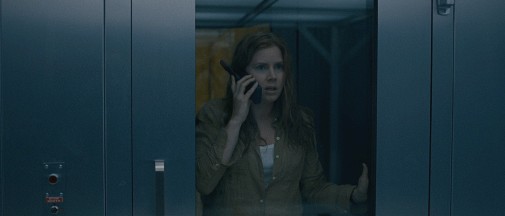
As mentioned before, precursor-wise, the actress had everything necessary to consider herself a lock going into Oscar nomination morning. Still, AMPAS' known prejudices against genre pictures probably cost her the nod. The actual nominees were Isabelle Huppert in Elle, Ruth Negga in Loving, Natalie Portman in Jackie, Emma Stone in La La Land, and Meryl Sreep in Florence Foster Jenkins. Even when the Academy deems a fantasy or sci-fi flick worthy of multiple nominations, they're reluctant to bestow gold on their actors. Furthermore, Adams' performance, no matter how formidable it is, remains internal throughout and mostly devoid of explosive Oscar clips. It would have been a great nomination, but it's easy to see why it missed when studying the Academy's long history.
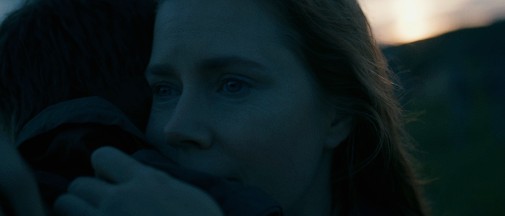
You can rent Arrival from several services like Amazon, Google Play, Youtube, and others.